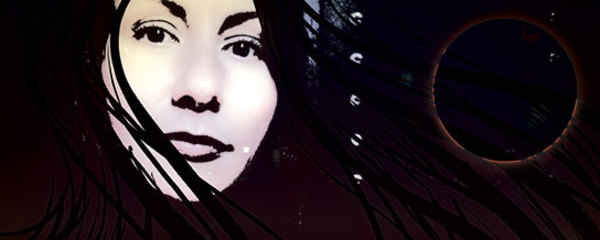Judith Juilerat: Sinister Lullabies
The harshly beautiful music of Judith Juillerat speaks pointedly of rain-damp alleyways in Berlin or […]
Judith Juilerat: Sinister Lullabies
The harshly beautiful music of Judith Juillerat speaks pointedly of rain-damp alleyways in Berlin or […]

The harshly beautiful music of Judith Juillerat speaks pointedly of rain-damp alleyways in Berlin or Cologne, so it’s a shock to find out that she operates light years away from Germany’s techno epicenters. Juillerat hails from Besançon, a sleepy French town with no music community to speak of–it’s home to nothing much, actually, besides some nice foliage and the aged walls of the town citadel. And as a 36-year-old, full-time mother–entering the studio only after her two kids are asleep–Juillerat is both a latecomer and an anomaly in the electronic music game.
Juillerat also boasts a surprisingly wholesome bio for one whose music is so dark. “I like listening to uneasy music,” she explains. “It’s good sometimes to be face to face with fear. It allows us to start from scratch. But, of course, I avoid listening to too much terrifying music with my children–they will have plenty of time to hear it later!”
It’s telling that Juillerat’s first album, Soliloquy, unfurls like a collection of sinister lullabies. Employing a limited arsenal of hardware (“software is too indirect”), she crafts techno love letters pulsating with mechanized cricket drones, the echoes of distant bells, and her own smoky voice. Tracks are by turns soothing and discomfiting, like “mes nuits sont plus belles que vos jours,” which begins with a music box chime and Juillerat’s bedtime humming, but disintegrates into an eerie loop of the Pledge of Allegiance.
By Soliloquy’s release, Juillerat had already been making music in her living room for 12 years, first “borrowing” her then-boyfriend’s gear, then improvising on her own, inspired by albums like Laurie Anderson’s Bright Red/Tightrope. But she’d never made anything public before 2004, when–on one fateful Friday–a friend told her about a UNICEF-sponsored contest to remix Björk’s “Army of Me.” The contest ended that Monday, and an energized Juillerat worked through the weekend to produce the seething revision–renamed “a(r)mour” on Soliloquy–that would ultimately win out over 600 contestants.
The same year, Juillerat began talking to the Berlin-based Shitkatapult label. “Their eclecticism attracted me,” she recalls. “So one day I just sent a demo. Three months later I was in touch with [label boss T. Raumschmiere], who said he loved ‘haphazardly’ and would like to make a version for his album.” (The track, featuring Juillerat’s muted monotone, appeared as “3 Minutes Happiness” on his 2005 Blitzkrieg Pop.) When Juillerat announced that she had a completed album ready–redone heavily with vocals after her work on “Army of Me”–Shitkatapult jumped to release it.
As Juillerat preps for her first-ever live performances in support of the album, Soliloquy appears as a personal testament to the road long traveled. “I picked the title to evoke my solitary musical work, because that was so important for me,” she says. “It’s the first time I’ve worked alone. I can’t help asking myself a lot of questions all the time. I wanted to make something intimate, which could make the listener ask some questions, too.”

